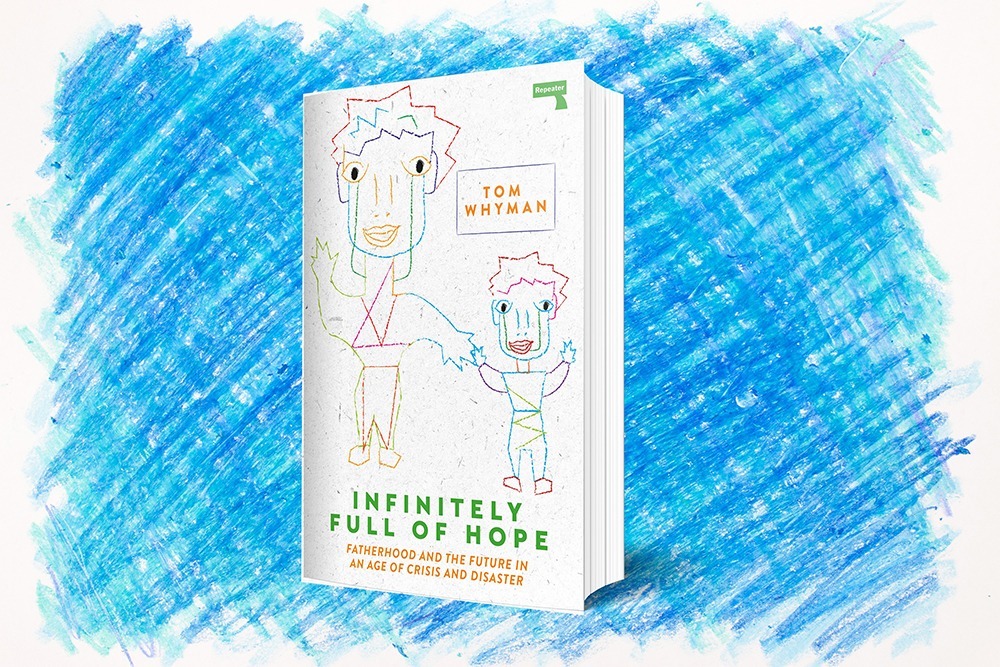
Infinitely Full of Hope (Repeater) by Tom Whyman
In his first book, philosopher and, more importantly, new dad Tom Whyman uses the question “Is it cruel to bring new life into an awful world?” to explore the philosophy of hope. To do so, he brings heavyweights like Kant, Adorno and Kafka along for the ride, as well as giving the book a decidedly modern tone by discussing Jeremy Corbyn, Boris Johnson and Greta Thunberg. What place does hope have in the burning bin fire of 2021?
Whyman is a modern man, “very online” as the parlance goes, but acknowledges that the world his generation has inherited is looking more and more miserable. “I can count out my life in economic disasters,” he says, in one of the book’s too few poetic lines. Given how badly we have messed up the planet, Whyman wonders if it is “baffling, even cruel” to bring new life into a seemingly hopeless world. (There is a bit of a spoiler for his readers: if he had not answered in the negative, the father and son on the book’s cover would be an incredible red herring.)
Millions of people, driven by a primal urge to create tiny versions of themselves, won’t stop to ponder the ethical dilemmas. But Whyman is a philosopher: it is his job to overthink things. He does so endearingly, going back and forth with himself and other writers, despite casually coming to his conclusion extremely early on in the book. A reordering of the material might have helped to sustain the reader’s suspense. As it is, the dense paragraphs of philosophy, often close to textbook level, have to do a lot of the heavy lifting. (When he says “Adorno’s message here is clear” he is talking about a man who wrote things like “consummate negativity, once squared, delineates the mirror-image of its opposite”.)
My own experiences, as a Corbyn-voting writer in his 30s who also had his first baby in July 2019, are strangely similar to Whyman’s. And there is no doubt that Infinitely Full of Hope will resonate loudest with the people who, like him, are anti-Brexit, anti-Tory and itching to do something about the climate crisis. The passages in which you can feel hope in action are those where Whyman is exhilarated about knocking on doors for Corbyn. “The rush of campaigning for a better future was identical with that of friendship, of solidarity,” Whyman writes.
Unsurprisingly, this is where the prose is most alive, as it puts into practice what is often (understandably) theoretical elsewhere. One reason Corbyn was inspiring was that he offered a profound form of hope. Whyman is obviously aware that the Corbyn wave trickled away, but at its height it embodied the antithesis to the “atomised individualism” that he believes stands in the way of true hope.
Like ice has a melting point, Whyman writes, hope has a despairing point; disappointment has to be a constituent part. Invoking Thunberg, who said, “I don’t want you to hope. I want you to panic,” he writes that we cannot fetishise hope for hope’s sake; our hope must be tinged with “the assumption of pessimism” in order for it to achieve anything. One could argue that this is what sank Corbyn, and that Obama (of whom Whyman is a little dismissive) understood this well enough in the world of politics to last eight years in office. Whyman might not agree, but he would give you an interesting argument.
In the acknowledgements, Whyman thanks his son Iggy for giving him hope in the future. This, then, might be the most profound answer to Whyman’s central question: becoming a father was the thing that truly made him understand the meaning of hope.
This article is from the New Humanist summer 2021 edition. Subscribe today.

